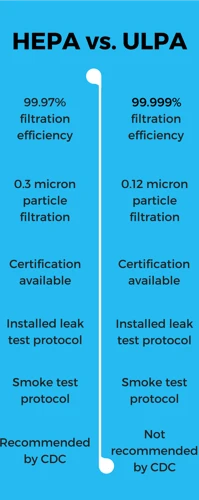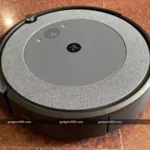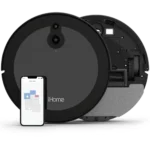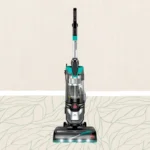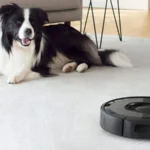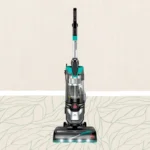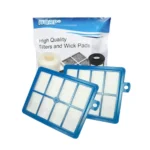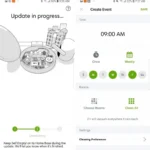Have you ever wondered about the air that you breathe in every day? The quality of the air can have a significant impact on your health and well-being. This is where air filtration comes in. There are various types of air filters available in the market, and two of the most common types are HEPA filters and standard filters. But what exactly is the difference between HEPA filtration and standard filtration? Which one should you choose for your home or workplace? In this article, we will dive deep into the world of air filtration and explore the benefits and specifications of both HEPA and standard filters. So, sit tight and let’s get started.
HEPA Filtration
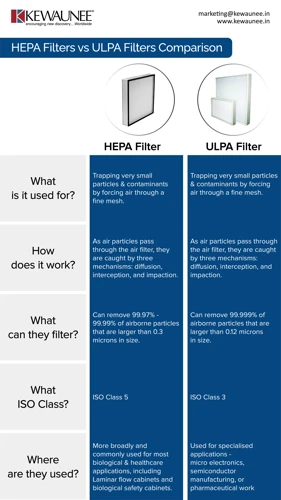
Are you concerned about the air quality in your home or workplace? Look no further than HEPA Filtration. This type of filter has become increasingly popular in recent years for its ability to remove small particles from the air, creating a healthier living environment. With benefits ranging from combating allergies to being more environmentally friendly, HEPA filtration is becoming a staple in many households. In this section, we will explore what exactly HEPA filtration is, its benefits, and who should consider using it. For a more detailed look at how HEPA filtration can improve home air quality, check out our article on HEPA Filtration for Home Air Quality.
What is HEPA Filtration
HEPA filtration stands for High Efficiency Particulate Air filtration. It is a type of air filter that can trap at least 99.97% of particles that are as small as 0.3 microns, making it highly effective against allergies, viruses, and other airborne particles.
These filters are made up of a mat of randomly arranged fibers that are usually composed of fiberglass. To display the effectiveness of the HEPA filter, the table below outlines the different types of particles, their sizes, and how HEPA filtration can trap them.
| Particle Type | Size (Microns) | HEPA Filtration Efficiency |
|---|---|---|
| Pollen | 10-1,000 | 99.97% |
| Household Dust | 1-100 | 99.97% |
| Bacteria | 0.3-60 | 99.97% |
| Mold Spores | 2-20 | 99.97% |
| Animal Dander | 0.5-100 | 99.97% |
| Smoke | 0.01-1 | 99.97% |
| Virus | 0.01-0.3 | 99.97% |
HEPA filtration is one of the most effective types of air filtration available, making it ideal for those with allergies, respiratory issues, or anyone who wants to breathe cleaner air. If you want to know more about the benefits of HEPA filtration in smart vacuums, you might find the benefits of smart HEPA vacuum interesting, or if you own a smart vacuum with HEPA filter, then HEPA filter maintenance is essential to ensure its longevity.
Benefits of HEPA Filtration
HEPA filtration is a popular option for those looking to improve the air quality in their homes. There are many benefits to using a HEPA filter over a standard filter.
1. Effective Filtration: HEPA filters have the ability to capture tiny particles as small as 0.3 microns from the air passing through them. These tiny particles can include pet dander, pollen, and even some viruses. The filtration efficiency of HEPA filters is higher than that of standard filters, making them a better choice for those who are particularly sensitive to airborne allergens.
2. Improved Air Quality: HEPA filters are known for being effective at improving indoor air quality. This is particularly important for those who suffer from respiratory illnesses such as asthma and allergies. The filters help to remove irritants from the air, which can help to reduce symptoms and improve overall health.
3. Environment-Friendly: Unlike some other types of air filters, HEPA filters do not rely on chemicals or other harmful substances to remove particles from the air. This makes them an environmentally friendly option for those who are concerned about their carbon footprint.
4. Debunked Myths: There are many myths and misconceptions surrounding HEPA filtration. For example, some people believe that HEPA filters can produce ozone, which is harmful to health. However, this is not true. HEPA filters are entirely safe and do not produce any ozone.
5. Helps Pet Owners: HEPA filtration is particularly beneficial for pet owners as it can help to remove pet hair and dander from the air. This is important for those who suffer from pet allergies, as it can significantly reduce symptoms.
If you’re looking for an effective and environmentally friendly way to improve the air quality in your home, HEPA filtration may be the way to go. Incorporating HEPA filters into your home can help to improve air quality, reduce allergens, and make your home a more comfortable and healthy place to live. If you want to learn more about benefits of a smart vacuum with HEPA filtration, you can check our article on “Benefits of Smart HEPA Vacuum”.
Who Should Use HEPA Filtration
HEPA filtration is a good option for those who are looking to reduce the amount of allergens, pollutants, and other harmful particles in their environment. Here are some examples of people who should consider using HEPA filtration:
- Allergy Sufferers: If you suffer from allergies, then HEPA filtration is a must-have. HEPA filters are capable of trapping even the tiniest of allergens such as pollen, dust mites, and pet dander. By using HEPA filters in your home, you can significantly reduce your exposure to these allergens and alleviate your allergy symptoms.
- Asthma Patients: Asthma patients are particularly vulnerable to airborne pollutants such as smoke, dust, and pet dander. HEPA filtration can help to reduce the amount of these pollutants in the air, making it easier for asthmatics to breathe.
- Pet Owners: Pet owners who love their furry companions and want to minimize the amount of dander and hair they spread around the house should consider incorporating HEPA filters into their cleaning routine. HEPA filtration can effectively capture pet hair, dander, and odor particles, resulting in a cleaner and healthier home environment for both pets and their owners. Want to learn more about HEPA filtration for pet owners? Check out our related article.
- Environmentally Conscious Individuals: HEPA filters are environmentally friendly options as they require less energy to operate and can effectively remove harmful particles without the need for harsh chemicals. HEPA filters also contribute to a healthier indoor air quality, which is particularly important for those who are concerned with sustainable and healthy living. Want to learn more about the environmental benefits of HEPA filtration? Check out our related article.
- Those with Smart Vacuums: If you own a smart vacuum, then HEPA filtration is likely already incorporated into your vacuum system. Smart vacuums are designed to tackle even the smallest of particles and are particularly effective when it comes to allergens and dust mites. Want to learn more about the benefits of HEPA filtration for smart vacuums? Check out our related article.
Anyone who is concerned about the quality of air they breathe should consider using HEPA filtration. There are many benefits to using HEPA filters, from reducing allergen exposure to promoting a healthy indoor environment. However, it’s important to note that HEPA filtration is not a solution for every problem. To learn more about the common myths and misconceptions surrounding HEPA filtration, check out our related article.
Standard Filtration

When it comes to finding the best air purification system, standard filtration is an option that many people consider. Standard filtration uses a system of mesh filters to trap dust and other harmful particles in the air. However, with the rise of HEPA filtration technology, many are wondering if standard filtration is still a viable option. In this section, we will take a closer look at standard filtration and explore its benefits and limitations in comparison to HEPA filtration. To discover more about the benefits of using HEPA filtration, check out our article on HEPA filtration for smarter cleaning and allergies relief.
What is Standard Filtration
Standard filtration is a type of air filtration that is commonly used in residential and commercial buildings. It typically involves the use of filters made from materials such as fiberglass or polyester. These filters are designed to capture a wide range of airborne particles, including dust, pollen, and pet dander.
The filtration efficiency of standard filters varies depending on the thickness and quality of the filter materials. However, they are generally less effective than HEPA filters at capturing smaller particles such as bacteria and viruses. This is because standard filters have larger gaps in their fibers and do not have the same level of filtration technology as HEPA filters.
Despite their lower efficiency, standard filters are still effective for improving air quality in many indoor environments. They are often used in HVAC systems to filter incoming air and keep it free of larger particles. They are also commonly used in standalone air purifiers and can be an affordable option for those who are looking to improve their indoor air quality without investing in more advanced filtration technologies.
One of the benefits of standard filtration is that these filters tend to be less expensive than HEPA filters. They are also widely available and can be found in many hardware stores and online retailers. Additionally, standard filters are easy to replace and require minimal maintenance.
However, it is important to note that standard filters are not suitable for all indoor environments or people with certain health conditions. For example, individuals with allergies or asthma may require a higher level of filtration to prevent symptoms. Additionally, standard filters may not be effective at capturing certain types of pollutants, such as volatile organic compounds (VOCs) and gaseous pollutants.
While standard filtration may not be as advanced as HEPA filtration, it still provides a useful function in many indoor environments. It is an affordable and easy-to-use option that can help improve air quality and reduce exposure to airborne particles.
Benefits of Standard Filtration
Standard filtration is a common method of removing impurities or contaminants from the air or fluids by using a filter that is rated based on its micron level. Although not as efficient as HEPA filtration, standard filtration has its own advantages that make it a viable option under certain circumstances.
Benefits of Standard Filtration
| Benefits | Explanation |
|---|---|
| Cost-effectiveness | Standard filters are generally more affordable than HEPA filters. This makes them a better choice for people on a tight budget or businesses that need to filter large volumes of air. |
| Energy efficiency | HEPA filters require powerful fans to push air through them, which can increase energy consumption. Standard filters, on the other hand, can be used with smaller, more energy-efficient fans, making them a more sustainable option for certain applications. |
| Easy to install | Standard filters are easy to install, maintain, and replace. You don’t need any specialist knowledge to install a standard filter, making them ideal for environments where trained technicians aren’t available. |
| Flexible | Standard filters come in a variety of sizes and shapes, so you can easily find the right filter for your specific needs. This flexibility also makes it possible to use standard filters in a wider range of applications than HEPA filters. |
Standard filtration can be a practical solution for situations where a high level of air quality is not essential or where cost and ease of use are higher priorities. However, it’s important to note that standard filtration may not be effective in removing all types and sizes of particulates, especially those that are smaller than five microns in size.
Who Should Use Standard Filtration
When it comes to air filtration, standard filtration can be suitable for certain situations and individuals. Here are some examples of who might benefit from using standard filtration:
- Those on a budget: Standard filtration systems are usually less expensive than HEPA filtration systems. So, if you’re looking for a cost-effective solution, standard filtration might be a good choice for you.
- Those with no major respiratory issues: If you don’t suffer from allergies or respiratory conditions such as asthma, standard filtration may suffice. Standard filters are typically designed to capture larger particles like dust and pet hair, which can still make a difference in the air quality of your home or office.
- Those with low levels of air pollution: If you live in an area with relatively low levels of air pollution, a standard filter may be enough to meet your needs. However, if you live in a city with high levels of pollution, HEPA filtration may be a better option.
- Those who don’t mind changing filters frequently: Standard filters may need to be changed more frequently than HEPA filters since they can become easily clogged with large particles. If you don’t mind changing filters every few months, a standard filter may be an adequate choice.
Keep in mind that standard filtration may not be sufficient for those with serious allergies or respiratory conditions. If removing smaller particles and allergens from the air is a priority, HEPA filtration is likely the better choice. It’s important to consider your specific needs and budget when deciding which type of air filter to use.
HEPA vs. Standard Filtration Comparison
As we have discussed in the previous sections, both HEPA and standard filtration systems have their unique features and benefits. However, when it comes to making a decision between these two filtration systems, it can be perplexing to decide which one to choose. In this section, we will compare HEPA and standard filtration based on different aspects to help you make an informed decision. So, let’s dive into the comparison!
Particle Size Filtration
When it comes to air filtration systems, one of the most important factors to consider is how effective they are at removing particles of different sizes. HEPA and standard filtration systems differ in their ability to filter out particles based on their size.
HEPA Filtration: HEPA filters are specifically designed to remove particles that are 0.3 microns or larger in size. This includes common allergens such as pollen, dust mites, and pet dander. HEPA filters are capable of capturing up to 99.97% of particles that fall in this size range.
Standard Filtration: Standard filters, on the other hand, vary in their ability to capture particles based on their Minimum Efficiency Reporting Value (MERV) rating. Filters with higher MERV ratings are designed to capture smaller particles, while filters with lower MERV ratings are less effective at capturing particles that are smaller in size. Most standard filters will capture particles that are at least 1 micron in size, but may not be as effective at capturing particles that are smaller than this.
To compare the effectiveness of HEPA and standard filters, we can use a table to illustrate how many particles of different sizes each type of filter can capture.
| Particle Size | HEPA Filtration | Standard Filtration |
|---|---|---|
| 0.3-1 microns | 99.97% | 40-80% |
| 1-3 microns | 99.97% | 90-95% |
| 3-10 microns | 99.97% | 90-95% |
| 10+ microns | 99.97% | 80-90% |
As you can see, HEPA filters are significantly more effective at capturing particles that are 0.3 microns or larger in size, with a capture rate of 99.97%. Standard filters with MERV ratings of 11 or higher can capture particles that are as small as 1 micron, but are less effective at capturing particles that are smaller than this.
When it comes to particle size filtration, HEPA filtration is the clear winner. If you are looking for a filter that can capture the smallest possible particles, such as those that cause allergies or respiratory problems, a HEPA filter is the way to go.
Air Quality
When it comes to determining which filtration system is best for improving air quality, it’s important to consider the size and number of particles that are being filtered out. HEPA filters are able to capture particles as small as 0.3 microns, while standard filters typically only capture particles as small as 1 micron. This means that HEPA filtration is much more effective at removing smaller particles like pollen, dust mites, and pet dander.
In contrast, standard filtration is better suited for removing larger particles like hair, pet fur, and larger dust particles. While it may not be as effective at removing small particles, standard filtration is still capable of improving air quality by removing larger particles that can contribute to respiratory issues and allergies.
It’s also worth noting that HEPA filters typically require more powerful motors and higher airflow rates in order to function correctly. This can result in slightly louder operation and slightly higher energy costs. Standard filters, on the other hand, are generally much quieter and more energy-efficient.
Ultimately, the decision between HEPA and standard filtration depends on your individual needs and preferences. If you or someone in your household suffers from asthma, allergies, or other respiratory issues, HEPA filtration may be the best choice for improving air quality. However, if you’re simply looking to remove pet hair and larger dust particles from your home, standard filtration may be perfectly adequate.
To sum up the comparison of air quality between HEPA and Standard Filtration, we have created a table to facilitate the comparison process:
| HEPA Filtration | Standard Filtration | |
|---|---|---|
| Particle Size Filtration | Filtration down to 0.3 microns | Filtration down to 1 micron |
| Effectiveness | Highly effective at removing small particles like pollen, dust mites and pet dander | Effective at removing larger particles like hair, pet fur and larger dust particles |
| Noise Level | May require more powerful motors resulting in slightly louder operation | Generally much quieter |
| Energy Efficiency | Requires more energy to function correctly | More energy efficient |
Cost Comparison
When it comes to the cost comparison between HEPA and standard filtration, there are some important factors to consider. HEPA filters are typically more expensive than standard filters, but they offer superior air filtration capabilities that can be well worth the investment.
HEPA Filtration Costs:
HEPA air purifiers and filters can cost anywhere from $50 to $1,000 or more, depending on the size, brand, and specific features. They also require periodic filter replacements, which can cost anywhere from $20 to $300 per filter, depending on the model and quality.
Standard Filtration Costs:
Standard air filters are generally much less expensive than HEPA filters, with prices ranging from $2 to $50 or more depending on the size and brand. They also require periodic filter replacements, which can cost anywhere from $2 to $20 per filter, depending on the quality.
The Bottom Line:
While HEPA filters may seem more expensive at first glance, they offer superior air filtration that can help improve the overall air quality of your space. Standard filters may be more affordable, but they may not be as effective at filtering small particles and contaminants. Ultimately, the best choice will depend on your specific needs and budget.
Here’s a table for a clearer comparison between HEPA and standard filtration costs:
| HEPA Filtration | Standard Filtration | |
|---|---|---|
| Air Purifier/Filter Cost | $50-$1,000+ | $2-$50+ |
| Filter Replacement Cost | $20-$300 per filter | $2-$20 per filter |
As you can see, HEPA filtration generally costs more than standard filtration. However, it’s important to weigh the benefits of superior air filtration against the higher costs. In the end, investing in a high-quality air purifier with a HEPA filter can be a wise decision for those seeking cleaner, healthier air.
Conclusion
After exploring the differences between HEPA filtration and standard filtration, it’s clear that HEPA filtration is the superior choice for anyone looking to achieve the highest level of air quality. HEPA filters are able to capture particles as small as 0.3 microns, making them incredibly effective at filtering out allergens, bacteria, and viruses.
While standard filters may be less expensive upfront, they simply can’t compete with the level of filtration provided by HEPA filters. Standard filters typically only capture particles as small as 3 microns, which means they are unable to filter out many common allergens and can only provide basic air filtration.
So, who should use HEPA filtration? The answer is anyone who wants to achieve the cleanest and healthiest air possible. This includes those with allergies and respiratory issues, as well as anyone looking to maintain an overall healthy living environment.
In terms of cost comparison, while HEPA filters may be more expensive initially, they typically have a longer lifespan than standard filters and ultimately provide better value for their cost.
In conclusion, if you’re looking for the best air filtration system possible, then HEPA filtration is the way to go. While standard filters may be a more affordable option, they simply can’t compete with the level of filtration provided by HEPA filters. So, make the investment in your health and wellbeing by choosing HEPA filtration for your home or office.
Frequently Asked Questions
What is the difference between HEPA and Standard Filtration?
HEPA filtration can filter particles as small as 0.3 microns while standard filtration can only filter particles down to 2 microns or larger.
Is HEPA filtration necessary for my household?
It depends on your needs and concerns. If you have allergies, asthma, or other respiratory issues, HEPA filtration can greatly improve your air quality. If you have pets or live in an area with high pollution, HEPA filtration can also be beneficial.
Can standard filtration remove viruses from the air?
Standard filtration cannot remove viruses as they are typically smaller than the particles it can filter out. However, HEPA filtration can remove some viruses from the air.
What types of particles can be filtered out by HEPA filtration?
HEPA filtration can filter out a wide range of particles including dust, pollen, mold, pet dander, and some viruses.
Are there any downsides to using HEPA filtration?
One downside of HEPA filtration is that it can be more expensive than standard filtration. Additionally, some HEPA filters need to be replaced more frequently than standard filters, which can also add to the cost.
Do all air purifiers use HEPA filters?
No, not all air purifiers use HEPA filters. Some air purifiers use different types of filtration systems, such as activated carbon or ionization.
How often should I replace my HEPA filter?
You should replace your HEPA filter according to the manufacturer’s recommendations. In general, most HEPA filters should be replaced every 6 to 12 months, depending on usage.
Can HEPA filters be cleaned and reused?
Most HEPA filters cannot be cleaned and reused. However, some manufacturers sell washable HEPA filters that can be cleaned and reused multiple times.
Can I use a HEPA filter in my HVAC system?
Yes, you can install a HEPA filter in your HVAC system if it is compatible. However, you should consult with an HVAC professional before making any modifications to your system.
How much more does HEPA filtration typically cost than standard filtration?
HEPA filtration can be significantly more expensive than standard filtration. The cost will depend on the size and type of filter you need, but you can expect to pay at least two to three times more for a HEPA filter than a standard filter.
